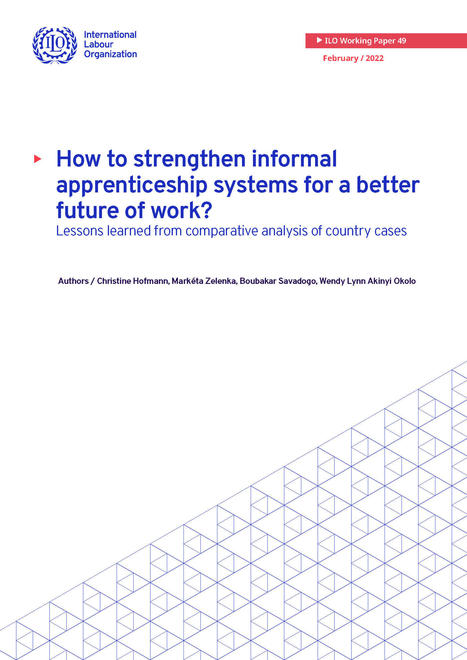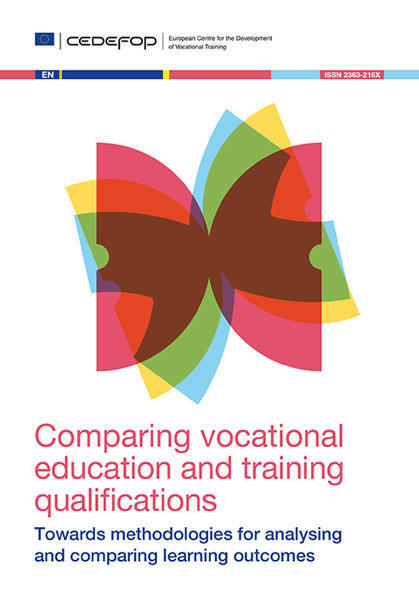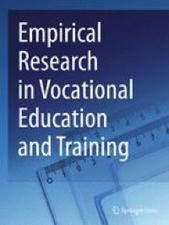 Your new post is loading...
 Your new post is loading...
The purpose of this paper is to highlight the particularitie continuing training models in France and Denmark in order to examine their differences and similarities. This comparison will underscore how the incumbent systems reflect the positioning and dialogue between ds ofomestic public policies, labour market stakeholders, vocational training institutions, the unions and employers’federations.
In the ever-evolving landscape of education, the battle between blended learning and traditional learning approaches continues to rage on. These two educational paradigms represent distinct methodologies, each with its own set of advantages and disadvantages. As the digital age progresses, the conversation about which is superior intensifies, leaving educators and learners pondering which path to choose. In this comprehensive exploration, we will dissect the concepts of blended learning and traditional learning, weighing their merits, and attempting to discern the most effective route to academic success.
This working paper undertakes a meta study on informal apprenticeship in developing countries. It compares the findings of country-level research conducted by the ILO and others in the past 15 years to shed more light on apprenticeship systems in the informal economy. It discusses the features and practices of informal apprenticeship systems, their responsiveness to rights at work, and the effectiveness of such systems along criteria such as dropouts, training quality, and transitions to employment. The analysis is complemented by a selected number of country case studies that describe and assess the policies and programmes that were introduced during past years to strengthen and upgrade apprenticeship systems in the informal economy. The findings aim to improve understanding of this complex, heterogenous, yet self-sustained training system in the informal economy for evidence-based discussions and policy dialogue between ILO constituents and beyond.
Our latest research reveals that VET qualifications enable graduates to be more job ready compared to higher education qualifications. This report explores occupations that can be entered into via either a vocational education and training (VET) pathway or a higher education pathway. It examines whether these individuals do the same job tasks and roles, if there are differences in how well the qualifications prepare them for the role and whether they have the same occupation and employment outcomes, such as salary and career pathways.
Looking into the challenges related to the in-depth analysis and comparison of the content of VET qualifications, the report provides a methodological basis on which both researchers and policy-makers can build.
This working paper undertakes a meta study on informal apprenticeship in developing countries. It compares the findings of country-level research conducted by the ILO and others in the past 15 years to shed more light on apprenticeship systems in the informal economy. It discusses the features and practices of informal apprenticeship systems, their responsiveness to rights at work, and the effectiveness of such systems along criteria such as dropouts, training quality, and transitions to employment. The analysis is complemented by a selected number of country case studies that describe and assess the policies and programmes that were introduced during past years to strengthen and upgrade apprenticeship systems in the informal economy. The findings aim to improve understanding of this complex, heterogenous, yet self-sustained training system in the informal economy for evidence-based discussions and policy dialogue between ILO constituents and beyond.
The purpose of this study is to gain an understanding of the teaching strategies used by lecturers in Indonesia and Malaysia during the COVID-19 pandemic.
One of the dominant narratives in the media is that we need to produce more workers now who can do whatever is needed now, using short-term post-secondary certification programs. The focus is typically on “vocational” skills, contrasted with what too often are characterized as relatively useless liberal education outcomes. Of course, short-term vocational skills-based programs are critically important and well suited for many people. But this is not an acceptable policy choice for addressing the demands of the 21st century workplace and fixing the shortcomings of American higher education. Abbreviating post-secondary preparation programs may well reduce short-term costs for students, institutions, and many employers. However, privileging short-term job training over demanding educational experiences associated with high-levels of intellectual, personal, and social development — a foundation for continuous life-long learning — is a bad idea for individuals, for the long-term vitality of the American economy, and for our democracy.
The purpose of the paper is to investigate the figure of the highest skilled workers of Industry 4.0, the need of protection and more freedom to operate in the labour market, and the possible solution to this issue.
The purpose of this paper is to compare a firm’s net cost and post-apprenticeship benefits of providing apprenticeship training in Austria and Switzerland: two countries with many similarities but some critical institutional differences.
This report sets out an analysis of the technical and conceptual characteristics of the European Qualifications Framework (EQF) and the New Zealand Qualifications Framework (NZQF) in their operational contexts, identifying key elements of comparability and similarities and differences in a mutually beneficial way.
The aim of this research was to identify world-class apprenticeship standards and to make suggestions as to how these could be applied to the English system. By ‘world class’ we mean that the standards described here are acknowledged to be among the best in the world.
|
Abstract:
Technology is disrupting labor markets. We analyze the demand and reward for skills at occupation and state level across two time periods using job postings. First, we use principal components analysis to derive nine skills groups: 'collaborative leader', 'interpersonal & organized', 'big data', 'cloud computing', 'programming', 'machine learning', 'research', 'math' and 'analytical'. Second, we comment on changes in the price and demand for skills over time. Third, we analyze non-linear returns to all skills groups and their interactions. We find that 'collaborative leader' skills become significant over time and that legacy data skills are replaced over time by innovative ones.
Context: International comparative research on Vocational Education and Training (VET) is gaining importance, as global cooperation and mutual learning in VET grows. However, it is characterized by a high degree of complexity, due on one hand, to the heterogeneity of the VET sector, and on the other hand to the unique challenges of international comparisons. In addition, comparative research projects are increasingly conducted in the form of cross-border collaborations, which have their own particular organizational and methodological considerations, opportunities, and challenges. This paper presents an example of a cooperative research process, aimed at investigating the complex phenomenon of the competence-based approach in Russian and Chinese VET. In providing an example of developing an instrument for curriculum analysis and comparison, we discuss and reflect on the methodological and organizational peculiarities and challenges of the research process conducted collaboratively by an international team.
Method: The instrument for analysis and comparison of curricular documents, was developed in an iterative multi-stage process, combining deductive and inductive steps. The embeddedness of the elements of a competence-based approach in curricular documents is investigated, using qualitative content analysis. To develop a coding frame, we started with a comprehensive partially systematic literature review of international, Russian and Chinese discourses on competence-based curricula. The frame was built on the selected model of competence-based education, and on accumulated results of the literature analysis of national discourses. Furthermore, during the first coding process, an iterative adaptation of the developed instrument took place.
Results: The result of this process was the development of an analysis instrument which, on the one hand, is well-adapted to each national context and, on the other hand, allows a comparison of results along the same dimensions of analysis, in our case, elements of the competence-based approach in curriculum.
Conclusion: Developing an analysis framework for a cross-cultural comparative investigation of such a diffuse and heterogeneous construct as the competence-based approach, can pose a methodological challenge for an international team of researchers. However, an effective application of own team resources such as proficiency in different languages, insider and outsider perspectives, along with continuous intensive communication and a flexible, iterative research process, allows development of a well-adapted analysis instrument for international comparison.
This paper seeks to shed light on the current challenges faced by eight selected sub-Saharan African countries, namely Burkina Faso, Chad, Mali, Mauritania, Mozambique, Niger, Nigeria, and Sierra Leone, in achieving the integration of women into the labour market through education and training. In almost all these countries – except Sierra Leone – women are less likely to be employed than men. Moreover, most employed women have insecure, low-paying, and informal jobs. In addition, women performing these jobs are hardly protected against job losses. The lack of protection is also apparent in times of illness and when they are ageing. More women are concentrated in occupations and sectors that are characterized by low status and low remuneration. Furthermore, they continue to be underrepresented and excluded from sectors and jobs that involve greater responsibility, pay more salaries, and offer potential for growth. The reasons for the under-representation of women in prestigious jobs are varied and are rooted on factors such as gender norms and stereotypes, unpaid care at home, and legal frameworks that are unfavourable to women. This paper aims to present a diagnosis of women’s situation in terms of their integration into the labour market. It will focus mainly on the role played by education and training in attaining gender parity and identify practices that will potentially address the marginalization of women in the labour market
Every three years, the Programme for International Student Assessment (PISA) is conducted. It is the most extensive and widely accepted measure of academic proficiency among lower secondary school students around the world. In the most recent tests, Canada did comparatively well internationally. But results in all three disciplines — reading, math and science — have declined right across the country. A new study published by the Fraser Institute today finds that over the twelve most recent testing years: - Canada dropped 7 points in reading while all other G7 countries made gains.
- Canada dropped 17 points in science while the USA gained 14 over the same period.
- Canada dropped 15 points in math while four G7 countries, including the UK and USA, made an average gain of 10 points.
In the context of considerable labour market change, many adults in Canada are being challenged to consider alternative career paths, and to upskill or retrain. Career guidance has the potential to facilitate employment transitions: not only from the education system to the labour market, but also from unemployment to employment, and from declining to growing sectors. This study assesses the career guidance services that are available for adults in Canada, and puts them into an international perspective. New survey data show that Canada performs well in an OECD comparison with respect to the quality of career guidance, but there is room to strengthen the provision and accessibility of services. The report provides concrete recommendations to encourage greater and more inclusive use of adult career guidance, and to promote high-quality service provision.
The findings indicate that there are differences in knowledge work identified in two groups of workers, nonetheless, support the conclusion that knowledge works are equally crucial for skilled workers to optimise their role. The findings of this study imply that the role of the two groups of workers could not be described interchangeably within a similar working-class and these findings could be used to create clear distinction in the definition and descriptions of work practices of knowledge and skilled workers within the TVET sectors.
VET (vocational education and training) is a highly complex, multidimensional worldwide phenomenon with diverse structures. Additionally, very different actors define the functions of a national (or even a regional) VET system. The paper contributes to a better understanding of the policy frameworks and current states of such systems. Therefore, we focus on selected VET systems in order to understand their specifics and thus, their market conditions. A qualitative approach is used to answer the research question regarding which conditions create or support market-based opportunities for the provision of commercial vocational training services. We find that the liberalism and deregulation of the VET sectors, as well as the marketisation of VET practices, lead to incentives to internationalise VET offers. Thinking in terms of skills, the kind of education system does not play a role. This is the case in liberal market-driven VET approaches (here, the UK, the USA and Australia) and is mirrored in the micro-analysis categories of curricula, learning location, content, and learning process.
In both Canada and the United States, immigrants are a large source of labour supply with training in science, technology, engineering and mathematics (STEM). In Canada, adult immigrants accounted for 44% of all individuals aged 25 to 64 with a university degree in a STEM field in 2016, compared with 24% in the United States.
This paper uses both the descriptive and comparative approaches to provide overview of migration of higher education students from North Africa region. We fill the gap in the African literature and present a more comprehensive and recent analysis of migration of higher education students from North Africa region using UNESCO recent secondary data on international students mobility in tertiary education. We provide an interesting comparative analysis of migration of higher education students from North Africa region compared to South Africa.
Adult migrants in all OECD countries are a diverse group, with different profiles and levels of education. Even if they hold tertiary degrees, they are more likely to have poorer labour market outcomes, including lower earnings. Participation in the labour market is more difficult for foreign-born adults who arrived at a later age and acquired their qualifications in another country. It is important that host countries design and implement policies that will help immigrants improve their chances in their labour market, benefitting both the person and the country.
le Cee étudie l'action des pouvoirs publics et des acteurs sociaux sur l'évolution de l'emploi (évolutions technologiques, organisation du travail, marché du travail…).
If an apprenticeship is to have credibility and worth for both individuals and employers, it must end up with a recognised qualification. And why would you have an apprenticeship without any formal assessment and feedback as part of that process? Assessment is a critical part of learning and improving
|



 Your new post is loading...
Your new post is loading...




















